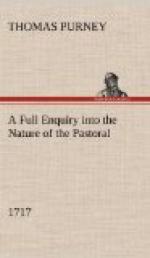The Method of Theocritus, and all his followers, shown to be inferiour, from the Nature of the Human Mind.
But further, to shew that we should not describe the Country in it’s Fatigues, it’s Roughness, or it’s Meanest, take these Few Considerations. For, as no Writer whom I have read (but that excellent Frenchman FONTENEL,) has raised his Shepherds and Shepherdesses above the vulgar and common sort of Neat-herds and Ploughers, I am oblig’d to dwell a little the longer on this Head.
It may be observ’d, I think, that there are but two States of Life which are particularly pleasant to the Mind of Man; the busy, great, or pompous; and the retir’d, soft, or easy. More are delighted with the former than with the latter kind, which affoard’s a calm Pleasure, that does not strike so sensibly, but proceeds much from the Imagination. Perhaps this may be the reason why Epick and Tragick Poetry are more universally pleasing than Pastoral; for they describe the Actions of such Persons, as most Men are dazled and enamour’d with; and would willingly quit their own Stations in Life for.
But tho’ this State of Life may perhaps be more generally engaging than the soft and retir’d; ’tis certain the soft is the next eligible, and consequently will shine the most next in Poetry. As no one would much desire to be one of Theocritus’s Shepherds, so ’tis plain, no one can be much delighted with being concern’d, as ’twere, with such; of having their Actions take up our Minds, and their Manner of Life set before us.
As a love of Grandeur, Show and Pageantry is implanted naturally in our Minds, so we cannot be pleas’d with any thing that is mean, low and beggarly; and as we dislike what is mean and beggarly, How can we love to have our Minds conversant about, direct Ploughmen, _&c_? We love the Country for it’s soft Retirements, it’s Silence, and it’s Shades, and can we love a Description of it that sets none of these before us? If I read a Pastoral, I would have it give me such a Prospect of the Country, and stop me upon those Objects, where I should myself stay, were I there; but would not that be (at least generally) upon the most beautiful Images. If the Toils of the Country-Folk took my Observance, ’twould only be for Variety, because those Images which a Poet can so plentifully raise out of his own Brain, can hardly be met with in Reality. But methinks were I determin’d to describe the Labours and Hardships of the Country, and not to collect the Beauties; I would e’en observe the Manner of the Fellows and Wenches in the Country, and put down every thing that I observ’d them act; as Mr. Gay has very well done; and than we shall have at least this Pleasure, of seeing how exactly the Copy and the Original agree; which is the same that we receive from such a Picture as show’s us the face of a Man we know.
Again, ’tis natural to the Mind of Man to delight in the Happiness of it’s Fellow-Creatures; and no Pleasure can be imbibed from the Prospect of another’s Misery; unless it is so calculated as to excite Pity. The Pleasure, that comes the nearest such of any, is a Comick one, which delight’s to see the human Form distorted and debased, and turn’d into that of a Beast.




